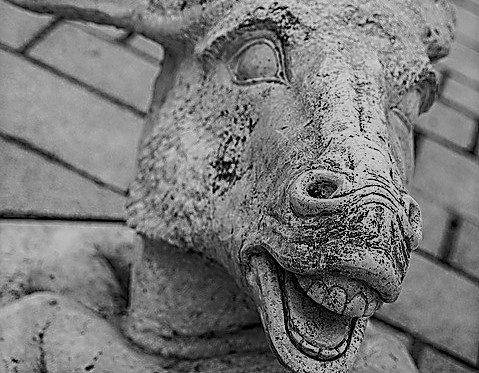
What?—Chesterton’s Guide to Cheese, Gargoyles, and the Book of Job
Lyssa Henry
G.K. Chesterton had the most unique positions on these three subjects I have ever seen. He had a great passion about the institution of eating cheese with bread instead of crackers, a fascinating origin story of gargoyles, and a new perspective on the book of Job that sets it apart from the rest of the New Testament.
In Chesterton’s essay “Cheese,” he reminds readers that there is not nearly enough mention of cheese in literature in comparison to how necessary it is as a resource, and the way that it could fit quite nicely in many different verses and manuscripts. It rhymes with several words that bring lyrical qualities to stories such as “breeze” and “seas,” and is even included in several phrases used in common conversation, like “Cheese it!” or “Quite the cheese.” While these are not terms so typically used today, in the period of him writing this, they could very well have been popular phrases. Chesterton goes on to explain a terrible experience he had while traveling when a place he stopped to eat served him cheese and crackers instead of cheese and bread. This outrageous concept had Chesterton so angered and bewildered that he said,
“I have therefore resolved to raise my voice, not against the waiter, but against Modern Society, for this huge and unparalleled modern wrong.”
Chesterton does have a peculiar, but unique eye for what is, or could be considered beautiful in the world, cheese being an oddity, but another noteworthy essay he wrote was on the unconventionally beautiful gargoyles that stand guard over churches and cathedrals. An explanation for why the statues are so grotesque, “On Gargoyles,” was written in the form of a story about a people worshiping a sun-god, whose priest told them to build a tower that reflected the purity and goodness of light, leaving out any material that could be considered grotesque or impure.
After this tower was built, the island which was the setting of the story was attacked by pirates, and after this war, the priest recognized that the sun gives light to not only the beautiful things, but also the ugly and evil things, so he had a new tower made of things that were ugly. The less beautiful features of the animals carved into the tower were exaggerated, as they were only created so that the animal could praise God. While all the singular parts of this cathedral were ugly, they came together as a whole to be a beautiful celebration of creation,
“because it was lifted up in one living and religious gesture as a man lifts his hands in prayer.”
This cathedral of mosaic discord was never completed, however, because in a quarrel, the priest’s head was hit by a stone, and he lost his memory. Since he couldn’t remember why he had gathered all the materials and made so many ugly statues, he put them all in a big pile and called it Realism. At this, Chesterton described Realism as “Romanticism that has lost its reason.” The essay all funnels down to explain Realism and Romanticism in this way, that
“a donkey could go before all the horses in the world when it was really going to the temple. Romance means a holy donkey going to the temple. Realism means a lost donkey going nowhere.”
Chesterton came to the realization that, like his fictional priest of the sun, he had gathered lots of great ideas and forgotten why he had done so and proceeded to lump them all together to create something different, so this gave him a new and accepting view on the less than pleasing appearance of the gargoyles so often seen on the sides of cathedrals.
On the topic of Realism, Chesterton wrote another essay on one of the most straightforward, yet still riddling books of the Bible, the book of Job. This book goes through the period in Job’s life that God allowed the Devil to test his faith, because God knew that Job was a faithful servant that would not let any hardships, no matter how difficult, stop him from praising and worshipping God the way He deserves to be praised. As a general summary of the essay “The Book of Job,” the quote, “The riddles of God are more satisfying than the solutions of man” seems the most fitting, as there is no man that has been alive other than Jesus Christ himself that could ever begin to understand why God does what He does and how everything that has ever happened and will ever happen is all part of a bigger plan that God already has for the world.